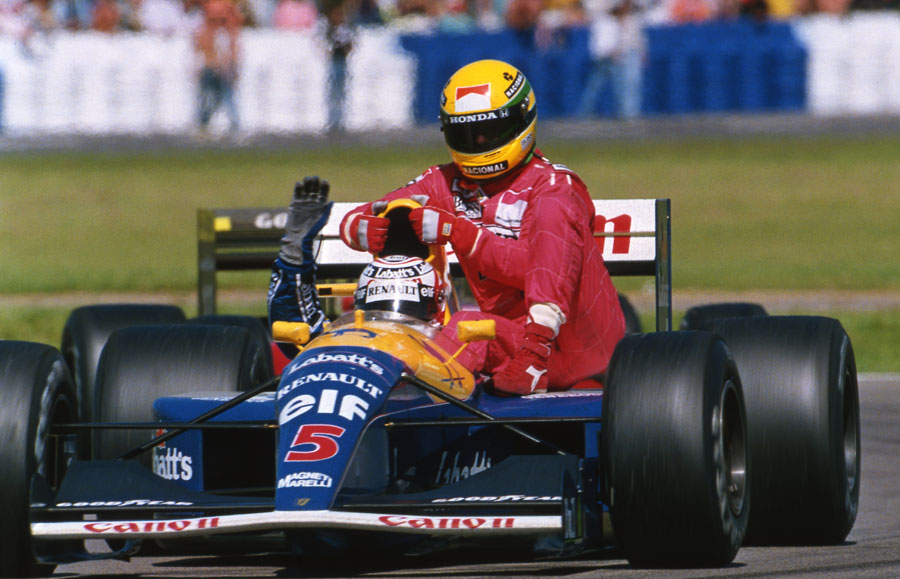- 1991
Senna pips Mansell to win third drivers' title

Season's results | Drivers' Championship | Constructors' Championship
Ayrton Senna and McLaren made it two World Championship titles in succession, while Nigel Mansell elected not to quit Formula One but to race for Williams, who were in strong form. He would challenge Senna, but would fall short.
McLaren kept its driver line-up of Ayrton Senna and Gerhard Berger, but there was a different engine behind their shoulders. It was still a Honda, but now a V12 in place of the V10.
Mansell's move from Ferrari to Williams opened the door for Jean Alesi to join Ferrari, leaving his seat at Tyrrell to Stefano Modena. His ride at Brabham and that of team-mate David Brabham, went to Mark Blundell and Martin Brundle.
Unhappy with uncompetitive machinery, Derek Warwick had stepped down from Formula One to race sports cars, with Formula Three hotshot Mika Hakkinen joining Johnny Herbert who'd stood in for Martin Donnelly for the final two races of 1990. With Ligier having failed to score a point, it also elected for a clean-out, with Thierry Boutsen and Formula 3000 champion Erik Comas replacing Philippe Alliot and Nicola Larini and Lamborghini engines taking over from Cosworths.
At the back of the grid, Eurobrun opted out of Formula One, Osella was taken over and re-emerged as Fondmetal while Modena Lambo made its entrance. A cut above these Italian teams was a third newcomer: Jordan. Entered by Formula 3000 team owner Eddie Jordan, it showed its hand at the first race when Bertrand Gachot qualified midgrid. With all of these new teams plus Coloni and Dallara having to pre-qualify for the right to enter qualifying proper, team-mate Andrea de Cesaris failed to make the grid but, before the year was out, would run second at Spa-Francorchamps.
Senna left his opposition standing by winning the first four races. The first, the US Grand Prix at Phoenix, was won by 16 seconds from Alain Prost's Ferrari and Nelson Piquet's Benetton. It was closer in Brazil, as Senna pipped the Williams of a fast-closing Riccardo Patrese with his own team-mate Gerhard Berger close behind. However, only one thing mattered to Senna: he'd won his home race at his eighth attempt.
The San Marino Grand Prix was easier, with only Berger finishing on the same lap. Patrese became the first driver to lead Senna, but his Williams suffered engine problems. Mansell went off on the first lap after colliding with Brundle. The cruellest luck of all struck Eric van de Poele when his Lambo's fuel pump failed with two laps to go when he was running fifth. Amazingly, this was the only race for which he qualified.
Next up was Senna's stamping ground: Monaco. He duly won. The closest anyone got to him was Modena. But his Tyrrell's engine blew, taking out Patrese who went off on its oil slick.
Mansell had the Canadian Grand Prix in his pocket, but his engine died when he waved to the crowds on the final lap, letting Piquet by for victory. Patrese hit the top in Mexico after a late-race challenge from Mansell. Senna followed them home, then attacked Honda for not having an engine able to match the Renaults.
Mansell took his first win of the year when Magny-Cours held the French Grand Prix for the first time, having swapped the lead with Prost. Senna resisted a challenge from Alesi for third. Mansell repeated his success at Silverstone. Senna should have been second, but he ran out of fuel on the last lap, letting Berger and Prost past. Mansell made it three in a row at Hockenheim. Amazingly, Senna ran out of fuel on the last lap again, this time losing fourth place.
Senna won in Hungary. With the power circuits to come, it was to be his last likely victory until a return to the twistier tracks. Spa-Francorchamps favours those with power, so it was a surprise to see Senna win. He had been outpaced by Mansell and Alesi, but both retired.
De Cesaris was set for second, but his engine failed. His team-mate was debutant Michael Schumacher, who outqualified him, but was out on lap one. By the next race he was driving for Benetton in place of Roberto Moreno. Senna led for many laps at Monza, but was eating his tyres so fell to second place behind Mansell. Schumacher scored his first points, coming fifth.
Patrese won in Portugal, but this was handed to him when Mansell lost a wheel leaving the pits. The wheel was reapplied, but in an illegal place, so Mansell was kicked out. Senna grabbed second. Mansell won at Barcelona from Prost and Patrese with Senna fifth. It was Berger's turn to win in Japan, albeit only after Senna slowed to let him pass. By then, the title was already his, having seen Mansell crash out of the race.
The season closed in Adelaide where Senna dominated in torrential conditions in a race that was halted after 14 laps. The race took place without Prost who'd been fired by Ferrari. He was leaving the team anyway, tired of the politics.
Reproduced from The Ultimate Encyclopedia of Formula One published by Carlton Books